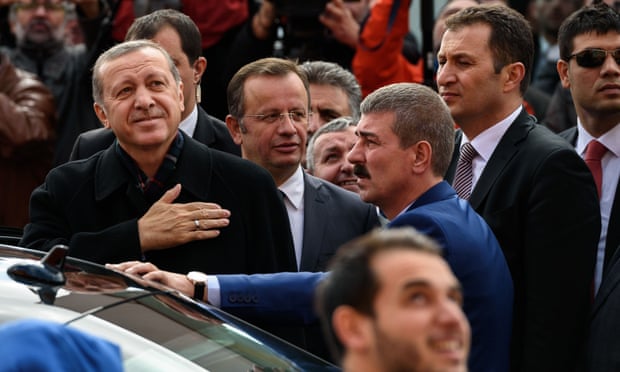Magazine editors accused of coup plot and Gülenists detained in wake of Justice and Development party’s resounding electoral victory

The Turkish government has resumed a crackdown on journalists and political rivals of Recep Tayyip Erdoğan just two days after a major electoral victory for his party that will see it return to single-party rule.
Police officers and bureaucrats loyal to an exiled cleric based in the US are among dozens of people who have been arrested by Turkish authorities in an ongoing move against a group whose members have become bitter rivals of the president.
Two senior editors at an opposition-aligned magazine were also detained on Tuesday and accused of plotting a coup after the front cover declared in the aftermath of the election “the start of civil war in Turkey”, a reference to anger in the predominantly Kurdish east and south-east where relations with the ruling Justice and Development (AKP) party are tense.
The magazine, Nokta, said in a statement on Twitter that the editor-in-chief, Cevheri Güven, and managing editor, Murat Capan, were detained after police raids on their offices in Istanbul and charged with “attempting to overthrow the government by force”.
Earlier, dawn raids targeted figures allied to a wide-ranging movement that pledges allegiance to Fethullah Gülen, a preacher who is set to stand trial in absentia for allegedly working to topple Erdoğan.
The prosecutor’s office in the western city of Izmir said it ordered the arrest of 57 people believed to be members of the “Gülenist terror group”.
The raids were the latest move in a campaign against the group that once maintained a pervasive presence in the judiciary and security services and helped orchestrate the prosecution of numerous military officials accused of plotting to overthrow the AKP-led government in the past.
Security services last week seized a company with supposed ties to Gülen that operates a number of media outlets including Bugün TV, which hosted several opposition politicians in the run-up to the November elections, including Selahattin Demirtaş, the leader of the pro-Kurdish HDP party.
The raid on the TV station, which remained on air during a standoff with police, dramatically illustrated the break in ties between Erdoğan and his former Gülenist allies.
Although the raid was officially described as part of an investigation by a court-appointed board into alleged financial crimes by the parent company, insiders say the crackdown is fuelled by a feeling of betrayal within the president’s party towards Gülen’s faction.
Gülenist officials were believed to have been involved in the Sledgehammer trials, which alleged that members of the Turkish armed forces had plotted to overthrow the AKP-led government, as well as the Ergenekon affair trials, in which hundreds of individuals were arrested and charged for allegedly belonging to a clandestine ultranationalist organisation that supposedly had ties with the military and security services and was bent on overthrowing the government.
The split with Erdoğan broke into the open in 2013 and 2014 after news emerged of a corruption investigation targeting AKP members and the president’s inner circle.
Erdoğan described the investigations as essentially a coup attempt and accused Gülen of infiltrating the security forces and judiciary; the president later carried out a purge of police officers. Prosecutors in Turkey last year charged Gülen, who has been living in Pennsylvania since 1998, with leading a criminal organisation.
Security forces separately imposed a curfew in the majority Kurdish town of Silvan in the south-east, following airstrikes against the outlawed separatist group the Kurdistan Workers’ party (PKK) in Iraq on Monday.
The PKK said in a statement it expected the war with the government to escalate after the elections.
Following attacks in the summer against activists, including Kurds, that were blamed on Islamic State, the government used the violence that erupted to crack down on the PKK, essentially ending a peace process that had led to a ceasefire in 2013.
Turkish government officials said the PKK had broken the ceasefire rules, including by fighting alongside Syrian Kurds across the border. Ankara believes Syria’s Kurds want to create a de facto state on Turkey’s southern border.
Critics contend that the government sought to crack down on Kurdish militants in order to attract nationalist votes in the snap elections, in which the AKP gained about 5 million votes.
No comments:
Post a Comment